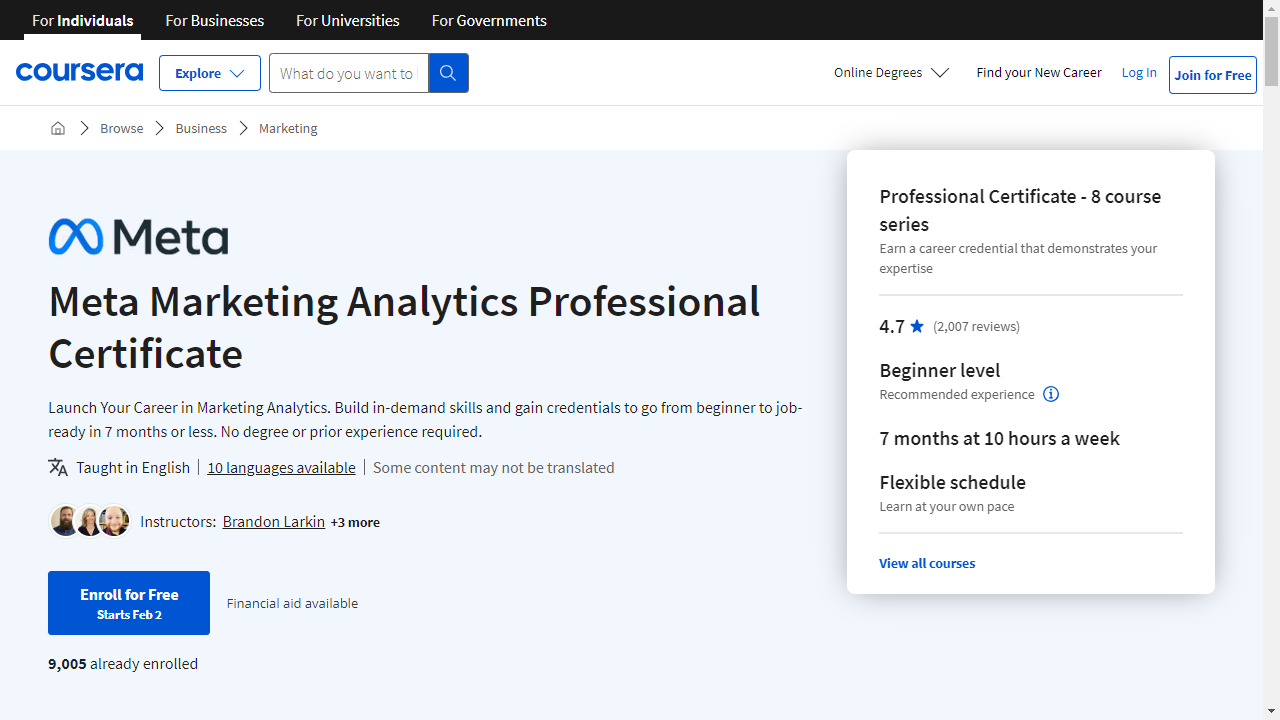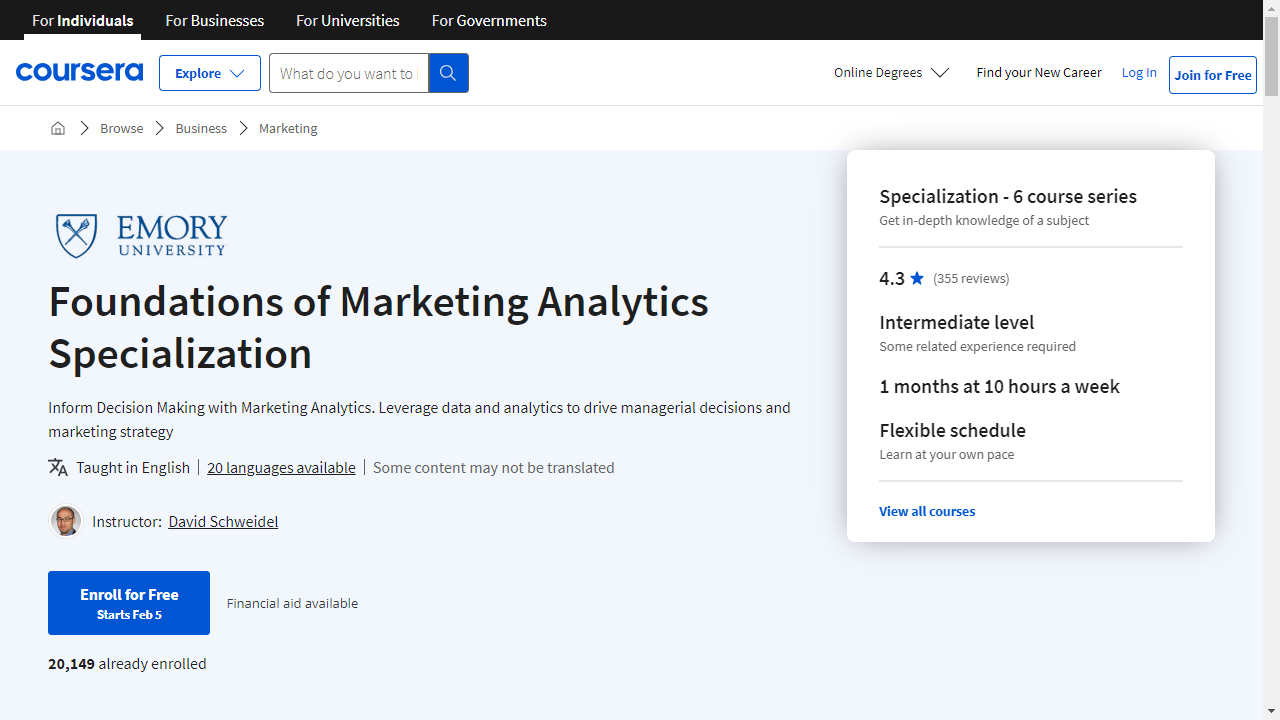Marketing analytics is the practice of measuring, managing and analyzing marketing performance to maximize its effectiveness and optimize return on investment (ROI).
Understanding marketing analytics allows marketers to be more efficient at their jobs and minimize wasted web marketing dollars.
By learning marketing analytics, you can gain valuable skills applicable to a wide range of industries and roles, from marketing analyst to data scientist.
Finding a high-quality marketing analytics course that truly delivers on its promises can be challenging with so many options available.
You’re looking for a course that goes beyond theory, providing practical experience and hands-on projects to solidify your understanding.
We’ve reviewed countless courses and based on our analysis, Meta Marketing Analytics Professional Certificate is the best course overall.
This comprehensive program equips you with the in-demand skills to launch a career in marketing analytics, covering data collection and analysis, SQL, Python, statistics, and Meta’s marketing tools.
It also includes valuable resources like study materials and guidance for the Meta Marketing Science Certification exam, making it a great choice for both beginners and experienced learners.
But if you’re looking for something more tailored to your specific needs, we have plenty of other options to explore.
Whether you’re interested in customer segmentation, web analytics or forecasting models, we’ve got you covered.
Keep reading for our full list of recommendations and find the perfect marketing analytics course for your journey.
Meta Marketing Analytics Professional Certificate
Provider: Coursera
The Meta Marketing Analytics Professional Certificate on Coursera equips you with the skills to excel in data-driven marketing.
You begin by grasping the fundamentals of marketing analytics, including data collection, analysis, and the significance of privacy regulations.
You quickly learn how to use essential tools like the Meta pixel for tracking website activity and navigate platforms like Google Analytics and Meta Ads Manager.
The program then introduces you to the OSEMN framework, a structured approach to managing analytics projects.
You will learn how to clean, analyze, and interpret data using spreadsheets and SQL, even creating visualizations and dashboards to present your findings.
For those who want to take their skills further, the program introduces Python programming for data analysis, allowing you to manipulate and visualize data with libraries like Pandas.
The curriculum then delves into statistics, covering crucial concepts like hypothesis testing, regression analysis, and statistical modeling.
You will develop the ability to make data-backed decisions, forecast marketing outcomes, and understand the intricacies of audience segmentation and marketing mix modeling.
A deep dive into Meta’s own marketing analytics tools follows, giving you hands-on experience with Meta Ads Manager for creating, testing, and optimizing ad campaigns.
The program culminates in preparing you for the Meta Marketing Science Certification exam.
You gain access to valuable study materials and guidance, enabling you to confidently demonstrate your expertise in the field.
Marketing Customer Analytics, Segmentation, and Targeting
Provider: Udemy
This Udemy course on “Marketing Customer Analytics, Segmentation, and Targeting” guides you through the essential elements of market research and customer analysis.
You will learn how to use powerful tools like GFK MRI and ESRI Business Analyst Online to understand your customers and create effective marketing strategies.
The course begins by establishing the importance of market segmentation and targeting in marketing.
You will explore different segmentation strategies based on factors like demographics, psychographics, geographic location, and behavior.
You’ll understand how to tailor your marketing messages to different groups and how to choose the right marketing approach for your business, whether it’s niche marketing or mass marketing.
You will then delve into the practical application of these concepts using real-world data and powerful analytical tools.
You’ll learn how to use GFK MRI, a leading market analytics tool, to segment the market, identify mass and niche markets for thousands of products and brands, and interpret data to extract valuable insights for informed decision-making.
The course provides hands-on experience, allowing you to practice your segmentation skills using real data from the U.S. market.
The course then introduces you to geo-market analytics, a crucial aspect of understanding market trends and customer behavior in specific locations.
You will discover the power of ESRI Business Analyst Online, a sophisticated cloud-based software, to analyze neighborhoods, assess market potential based on resident demographics, and even identify ideal locations for new businesses.
You will learn how to use Tapestry Segmentation to evaluate the residential composition of neighborhoods, a technique used by marketing professionals to optimize targeting strategies.
Foundations of Marketing Analytics Specialization
Provider: Coursera
This specialization equips you with the tools to transform raw data into powerful marketing insights.
You will start with the basics of data analysis in Excel, learning techniques like exploratory data analysis and regression methods to uncover patterns and trends.
You will then discover how to incorporate uncertainty into your marketing decisions using Monte Carlo simulations and probability distributions.
The specialization then guides you through building your own forecasting models in Excel, allowing you to anticipate future customer behavior and make informed decisions about your marketing strategies.
You will dive into survey analysis, learning how to use techniques like factor analysis and cluster analysis to understand customer perceptions and develop targeted marketing strategies within the STP framework.
You will need XL Stat to complete this part of the course.
Finally, you will explore social media analytics, learning how to extract valuable insights from social media data.
You will discover the benefits and limitations of social media data for market research and learn how to use social media listening tools to monitor customer sentiment and brand perception.
The specialization culminates in a capstone project where you will apply your learned skills to a real-world marketing problem, conducting exploratory data analysis, examining relationships between variables, and developing a predictive model.
Marketing Analytics: Stand Out by Becoming an Analytics Pro!
Provider: Udemy
This course takes you on a journey to becoming a marketing analytics pro.
You start by mastering web analytics, learning to calculate and use metrics like traffic sources and bounce rates.
Then, you dive into social media analytics, understanding how to leverage metrics like engagement and followers.
You also become well-versed in digital advertising analytics, where you’ll work with important metrics like click-through rates and cost-per-click.
You’ll apply these newfound skills to real-life case studies.
This hands-on experience helps you analyze data, ask insightful questions, and gain a deeper understanding of customer behavior.
The course guides you through building PivotTables and PivotCharts, using slicers to dig deeper into your data.
You learn to calculate essential metrics like customer acquisition cost and customer lifetime value, providing you with the insights needed to make informed decisions about your marketing strategies.
The course then challenges you to build a full projections model for a new marketing initiative.
You will learn to project ad revenue and expenses, calculate net profit, and determine breakeven points.
You even explore sensitivity analysis, which teaches you to assess how different factors impact campaign performance.
Finally, you learn to create dynamic dashboards that showcase your findings through eye-catching visuals, presenting key performance indicators in an interactive and easy-to-understand way.
Web Analytics & Digital Marketing Analytics - Zero to Hero
Provider: Udemy
This Udemy course takes you from beginner to expert in web analytics and digital marketing analytics.
You start with the basics of how web analytics works, learning about website traffic, user behavior, and conversions.
You then move on to the core components like website traffic sources, demographics, and engagement metrics.
This knowledge helps you understand the crucial role of a digital marketing analyst and how data impacts decisions.
The course dives into real-world applications of web analytics by examining the marketing analytics process.
You learn to define goals, gather data, analyze findings, and use strategies to improve online marketing.
You develop a strategic approach to web analytics, focusing on website optimization, user experience, and measuring campaign effectiveness.
You will also explore essential data sources and tools like Google Analytics and Adobe Analytics.
You learn how to interpret data, create reports, and draw valuable conclusions.
You then transform these insights into actionable recommendations, using data to optimize website content, landing pages, and the overall user experience.
The course equips you with the skills to make data-driven decisions about your digital marketing strategies, measure their impact, and achieve better results.
Marketing Analytics: Forecasting Models with Excel
Provider: Udemy
This course teaches you how to use Excel to make predictions about your marketing.
You start with the basics of forecasting, like identifying patterns and trends in your data.
Then, you learn how to use linear regression models to make predictions about the future.
You start with simple models and move on to more complex ones that use multiple factors.
Don’t worry if you’re not a math whiz!
The course explains everything in a way that’s easy to understand and shows you how to use Excel’s built-in tools to do the heavy lifting.
You’ll learn about RSE and R-squared, which tell you how well your predictions match up with reality.
You also discover how to handle unique situations like holiday sales, which can throw off your predictions if you’re not careful.
You learn how to spot trends and seasonality in your data and how to adjust your predictions accordingly.
You even explore ways to forecast sales for brand-new products using techniques like the S-curve, Gompertz curve, and Bass Diffusion model.
The course wraps up with a helpful crash course on Excel, covering everything from basic functions like Vlookup and IF statements to more advanced tools like pivot tables and charts.
Also check our posts on:






